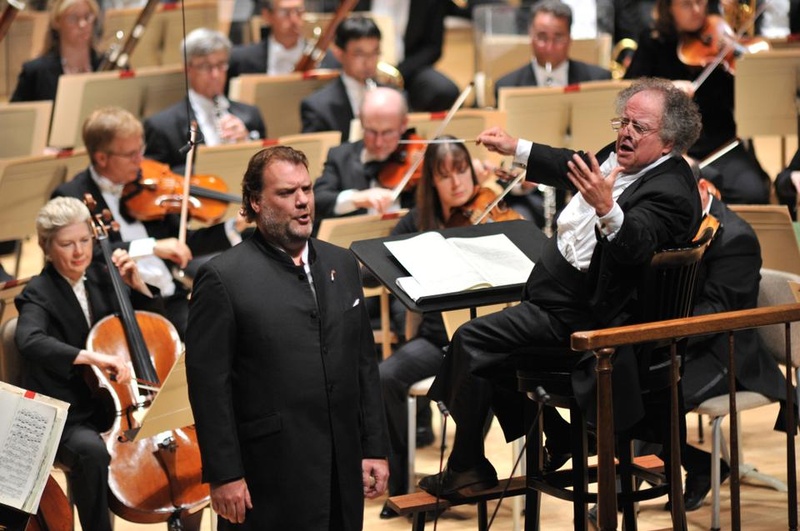
The Boston Symphony Orchestra opened its 130th season with Maestro James Levine back at its helm. The BSO performed an all-Wagner program, featuring solos by singer Bryn Terfel.
This past Saturday, the Boston Symphony Orchestra (BSO) commenced its 130th season with an all-Wagner program of symphonic overtures and operatic selections. The orchestra delivered a polished and spirited performance, but it was Welsh bass-baritone Bryn Terfel’s masterful singing that carried the night.
A packed hall of symphony benefactors and concert enthusiasts welcomed Maestro James Levine back to Symphony Hall with a standing ovation. Levine’s recurrent health issues had forced him to withdraw from the majority of the BSO’s performances last spring. The orchestra opened the program with a stately execution of the Prelude to Act I of German composer Richard Wagner’s “The Mastersingers of Nuremberg,” a three-act comedy-opera about a young knight’s quest to win the hand of the mastersinger’s daughter.
The ensemble handled the Prelude’s opening march theme with a sense of rhythmic pomp and circumstance befitting the gala occasion. Woodwind runs embellished lush high string passages, which then gave way to brass-heavy sections that hinted at recurring themes. Levine guided the orchestra in sustaining a Mozartian balance throughout the piece, never overplaying Wagner’s clean melodic lines. Levine then welcomed Bryn Terfel to the stage for the first of the three solos that the international opera star would sing that night. While a heavy-handed high strings section occasionally drowned out the soloist in his brief monologue in “The Mastersingers of Nuremberg,” Terfel’s voice nevertheless took center stage.
Terfel’s tone harbored a thoughtful focus that held steady throughout a slew of dynamic contrasts and tempo changes. His phrasing was equally grounded, creating incredibly smooth melodic lines that were broken only by the singer’s sharply syllabic articulations of the German libretto. Unlike many opera singers, Terfel kept his body almost completely still throughout the piece, allowing the nuance of his voice alone to guide the audience’s musical experience.
Levine then led the ensemble in a rendition of Wagner’s “Ride of the Valkyries” from the opera “Die Walkure,” often recognized as the theme that accompanied the classic helicopter landing scene in Francis Ford Coppola’s “Apocalypse Now.” Levine chose a tempo that was much more conservative than what might befit a movie soundtrack, but the relatively slow rendition still embodied a remarkable sense of vigor and excitement. Almost every section of the orchestra referenced the main theme throughout the piece, which culminated in a show-stopping coda that showcased the symphony’s dynamic capabilities in full force.
Terfel followed with the solo “Wotan’s Farewell” from the same opera. Terfel’s interpretation ran the full gamut of vocal expression: his voice soared with passion one minute only to taper in disappointment the next.
The third and final overture-operatic solo pairing of the program consisted of selections from the operatic staple “The Flying Dutchman.” The orchestra’s interpretation of the opening overture was particularly confident and spirited: Levine clearly has a flair for musical color that suited the overture perfectly.
Terfel closed the program with the “Dutchman’s Monologue”—a piece that, true to its roots in the Italian “recitative” style of vocal delivery, resembled speech more than it did song. Terfel’s pensive but hardly melodramatic rendition was again captivating—his moderate use of vibrato achieved a melodic line that was colorful but not too flighty. The relatively anti-climactic monologue, however, did seem a peculiar choice for ending the concert.
While the music showcased at opening night may have erred a bit on the monochromatic side, the programming—rather than the BSO’s performance caliber—was to blame. Levine has returned to near-top musical form, and the orchestra’s trademark musical cohesion remains intact. The rest of the season boasts more programmatic diversity, giving the orchestra much room to deliver.
—Staff writer Monica S. Liu can be reached at msliu@fas.harvard.edu.
Read more in Arts
Interweaving Endless Realities into One












